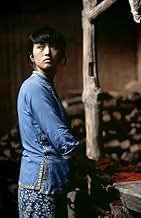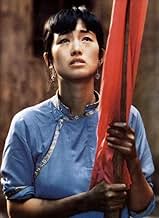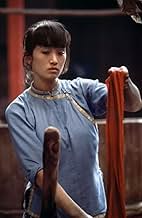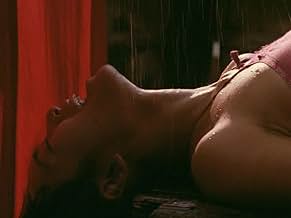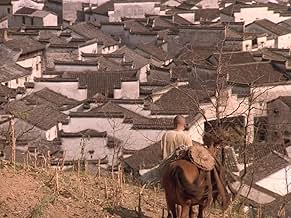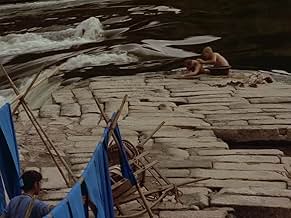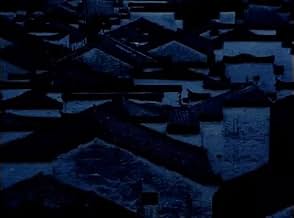PUNTUACIÓN EN IMDb
7,6/10
9,4 mil
TU PUNTUACIÓN
Añade un argumento en tu idiomaIn rural China, the young bride of a tyrannical owner of a silk-dyeing business finds temporary solace in the arms of her husband's nephew, but problems arise when she becomes pregnant.In rural China, the young bride of a tyrannical owner of a silk-dyeing business finds temporary solace in the arms of her husband's nephew, but problems arise when she becomes pregnant.In rural China, the young bride of a tyrannical owner of a silk-dyeing business finds temporary solace in the arms of her husband's nephew, but problems arise when she becomes pregnant.
- Nominado para 1 premio Óscar
- 8 premios y 6 nominaciones en total
Reseñas destacadas
The title character, a peasant sold as a concubine to a cruel old man, is played by the beautiful Gong Li, one of the great actresses of our time who followed this brilliant work with spectacular performances in The Story of Qiu Ju (1991), Raise the Red Lantern (1992), and Farewell, My Concubine (1993). Li Wei plays her master, Yang Jin-shan, the childless owner of a dye mill in the agrarian China of the 1920s. Li Wei's fine performance combines craftiness with iniquity reminding me a little of the late great John Huston with scruffy beard. The third character in the tragic triangle is Jin-shan's nephew, Yang Tianqing, a modest man who does most of the work in the dye mill. The pent-up intensity of Li Baotian, who plays Tianqing, recalled to me at times the work of Ben Kingsley. Ju Dou falls in love with Tianqing almost by default, and it is their ill-fated love that leads to tragedy.
In some ways this visually stunning, psychologically brutal film about paternity and the old social order of China was Director Zhang Yimou's "practice" for the making two years later of his masterpiece, the afore mentioned, Raise the Red Lantern, one the greatest films ever made. The theme of patriarchal privilege is similar, and in both films Gong Li portrays a young concubine required to bear a son and heir to a cruel and ageing man of means. Even though the setting in both films is China in the twenties before the rise of Communism, both films very much annoyed the ageing leadership of Communist China and were censured (Ju Dou was actually banned), ostensibly for moral reasons, but more obviously because of the way they depicted elderly men in positions of power.
Ju Dou is the lesser film only in the sense that Sirius might outshine the sun were the two stars placed side by side. Both films are masterpieces, but for me Ju Dou was difficult to watch because of the overt cruelty of the master, whereas in Raise the Red Lantern, Yimou chose to keep the more brutal aspects of the story off camera. In a sense, then, Raise the Red Lantern is the more subtle film. It is also a film of greater scope involving more characters, infused with an underlining sense of something close to black humor. (The very lighting of the lanterns was slyly amusing as it ironically pointed to the subjugation.)
In Ju Dou there is virtually no humor and the emphasis is on the physical brutality of life under the patriarchal social order. Ju Dou is beaten and tortured while we learn that Jin-shan tortured his previous wives to death because of their failure to bear him an heir. The terrible irony is that it is Jin-shan who is sterile. He feels shamed in the eyes of his ancestors because the Wang line will die out with him. But a child is finally born through Ju Dou's illicit affair with Tianqing. (Note that this conjoining in effect saves Ju Dou's life.) Jin-shan thinks the infant is his son and briefly all is serenity. However, while two may live happily ever after, three will not. Notice too that now that Jin-shan has an heir, nephew Tianqing will inherit nothing.
Will they kill Jin-shan? Will fortuitous events put him out of the picture?
Will they find happiness? Will the boy learn the truth about his paternity? Yimou's artistry does not allow superficial resolution, you can be sure.
Note the two significant turns the film takes early on. One comes after Ju Dou discovers that Tianqing has been spying on her through a peep hole as she goes about her bath. At first she is mortified, and then sees this as a chance to show him the scars from the torture she endures daily, and then she shows him her body to allure him. The other turn comes as the child pronounces his first words by calling the old man "Daddy." Instantly Jin-shan, now confined to a wooden bucket that serves as a wheelchair, divines a deep psychological plan to realize his revenge. He embraces the child as his own, hoping to turn the boy against the illicit couple.
The strength of the film is in the fine acting, the beautiful sets, the gorgeous camera work, and in the unsentimental story that does not compromise or cater to saccharin or simplistic expectations. Yimou is a visual master who turns the wood gear- and donkey-driven dye mill of the 1920s into a tapestry of brilliant color and texture. Notable is the fine work that he does with the two boys who play the son at different ages. He has them remain virtually mute throughout and almost autistically cold. Indeed part of the power of this film comes from the depiction of the character of the son who grows up to hate who he is and acts out his hatred in murderous violence toward those around him.
Zhang Yimou is one of the few directors who can bring simultaneously to the silver screen the power of an epic and the subtlety of a character study. His films are more beautiful than the most lavish Hollywood productions and as artistically satisfying as the best in world cinema. The only weakness in the film is perhaps the ending which is played like a Greek tragedy for cathartic effect. One senses that Yimou and co-director Yang Fengliang in choosing the terminus were not entirely sure how this tale should end and took what might be seen as an easy way out.
(Note: Over 500 of my movie reviews are now available in my book "Cut to the Chaise Lounge or I Can't Believe I Swallowed the Remote!" Get it at Amazon!)
In some ways this visually stunning, psychologically brutal film about paternity and the old social order of China was Director Zhang Yimou's "practice" for the making two years later of his masterpiece, the afore mentioned, Raise the Red Lantern, one the greatest films ever made. The theme of patriarchal privilege is similar, and in both films Gong Li portrays a young concubine required to bear a son and heir to a cruel and ageing man of means. Even though the setting in both films is China in the twenties before the rise of Communism, both films very much annoyed the ageing leadership of Communist China and were censured (Ju Dou was actually banned), ostensibly for moral reasons, but more obviously because of the way they depicted elderly men in positions of power.
Ju Dou is the lesser film only in the sense that Sirius might outshine the sun were the two stars placed side by side. Both films are masterpieces, but for me Ju Dou was difficult to watch because of the overt cruelty of the master, whereas in Raise the Red Lantern, Yimou chose to keep the more brutal aspects of the story off camera. In a sense, then, Raise the Red Lantern is the more subtle film. It is also a film of greater scope involving more characters, infused with an underlining sense of something close to black humor. (The very lighting of the lanterns was slyly amusing as it ironically pointed to the subjugation.)
In Ju Dou there is virtually no humor and the emphasis is on the physical brutality of life under the patriarchal social order. Ju Dou is beaten and tortured while we learn that Jin-shan tortured his previous wives to death because of their failure to bear him an heir. The terrible irony is that it is Jin-shan who is sterile. He feels shamed in the eyes of his ancestors because the Wang line will die out with him. But a child is finally born through Ju Dou's illicit affair with Tianqing. (Note that this conjoining in effect saves Ju Dou's life.) Jin-shan thinks the infant is his son and briefly all is serenity. However, while two may live happily ever after, three will not. Notice too that now that Jin-shan has an heir, nephew Tianqing will inherit nothing.
Will they kill Jin-shan? Will fortuitous events put him out of the picture?
Will they find happiness? Will the boy learn the truth about his paternity? Yimou's artistry does not allow superficial resolution, you can be sure.
Note the two significant turns the film takes early on. One comes after Ju Dou discovers that Tianqing has been spying on her through a peep hole as she goes about her bath. At first she is mortified, and then sees this as a chance to show him the scars from the torture she endures daily, and then she shows him her body to allure him. The other turn comes as the child pronounces his first words by calling the old man "Daddy." Instantly Jin-shan, now confined to a wooden bucket that serves as a wheelchair, divines a deep psychological plan to realize his revenge. He embraces the child as his own, hoping to turn the boy against the illicit couple.
The strength of the film is in the fine acting, the beautiful sets, the gorgeous camera work, and in the unsentimental story that does not compromise or cater to saccharin or simplistic expectations. Yimou is a visual master who turns the wood gear- and donkey-driven dye mill of the 1920s into a tapestry of brilliant color and texture. Notable is the fine work that he does with the two boys who play the son at different ages. He has them remain virtually mute throughout and almost autistically cold. Indeed part of the power of this film comes from the depiction of the character of the son who grows up to hate who he is and acts out his hatred in murderous violence toward those around him.
Zhang Yimou is one of the few directors who can bring simultaneously to the silver screen the power of an epic and the subtlety of a character study. His films are more beautiful than the most lavish Hollywood productions and as artistically satisfying as the best in world cinema. The only weakness in the film is perhaps the ending which is played like a Greek tragedy for cathartic effect. One senses that Yimou and co-director Yang Fengliang in choosing the terminus were not entirely sure how this tale should end and took what might be seen as an easy way out.
(Note: Over 500 of my movie reviews are now available in my book "Cut to the Chaise Lounge or I Can't Believe I Swallowed the Remote!" Get it at Amazon!)
A very well done story about the illicit relationship between a man and his "aunt" in 1920's China that results in disaster for all concerned. I've seen Gong Li in a couple of movies recently, and it's clear that she is both beautiful and talented. Here she plays the title character of Ju Dou, a young woman forced into marriage to Yang Jinshan, the brutal and sadistic owner of a dye mill, who beats and tortures her, and also wants her to bear him a son and heir. The mill is also home to Yang Tianqing, Jinshan's adopted nephew. Ju Dou and Tianqing fall in love with each other, and have a child, who is assumed to be Jinshan's. The result is tragedy all around eventually.
The story is both unpleasant and yet interesting. Few of the characters (with the exception of Ju Dou) really connected with me. Ju Dou, on the other hand, becomes the object of sympathy right from the start. Her life is horrible, and even the relationship with Tianqing (a gentle and loving one for the most part) ultimately strikes me as unsatisfying, because frankly Tianqing is a wimp. The character (well portrayed by Li Baotian) comes across as childish and immature and afraid the whole way through. In a way, the most powerful (and frightening in many ways) character was the adolescent Tianbai, Ju Dou's son. He only appears in the last third of the movie or so, but he comes across as completely hateful toward both his mother and Tianqing and totally unemotional. It all leads up to a tragic (and yet appropriate) ending.
One thing I really enjoyed in this movie was the depiction of the rituals around Jinshan's funeral procession. That was quite fascinating. Overall, this was an unpleasant movie with many unpleasant or at least unlikable characters, but still quite interesting. 7/10
The story is both unpleasant and yet interesting. Few of the characters (with the exception of Ju Dou) really connected with me. Ju Dou, on the other hand, becomes the object of sympathy right from the start. Her life is horrible, and even the relationship with Tianqing (a gentle and loving one for the most part) ultimately strikes me as unsatisfying, because frankly Tianqing is a wimp. The character (well portrayed by Li Baotian) comes across as childish and immature and afraid the whole way through. In a way, the most powerful (and frightening in many ways) character was the adolescent Tianbai, Ju Dou's son. He only appears in the last third of the movie or so, but he comes across as completely hateful toward both his mother and Tianqing and totally unemotional. It all leads up to a tragic (and yet appropriate) ending.
One thing I really enjoyed in this movie was the depiction of the rituals around Jinshan's funeral procession. That was quite fascinating. Overall, this was an unpleasant movie with many unpleasant or at least unlikable characters, but still quite interesting. 7/10
'Ju Dou' is a fine example of cinema at its rawest. Director Zhang Yimou hardly makes any use of special effects, keeps the background score at a minimum, makes the sets look very real (they don't even look like movie-sets) and yet he avoids his movie to look like a documentary. He seems to have relied most on the camera and actors to do the work. Even though the film is set in the 20s, 'Ju Dou' was one of the most controversial movies in China and it was banned arguably due to the way a powerful elderly man was depicted, a woman rebelling against a man and/or the depiction of injustice towards women in China and preference for a male heir.
A natural beauty, Gong Li in her early days, plays the title role of a peasant girl who's sold to an evil old man. This couldn't have been an easy part for a young actress to play but Li makes it look otherwise. She is phenomenal to watch. Li Wei as the cruel master does a great job too and he adds a humanity to his character that makes us sympathize for him. Li Baotian, as the evil master's nephew with whom Ju Dou has an illicit relationship, is just as brilliant.
The cinematography deserves special mention and some of the visuals and sceneries of the Chinese landscape are breathtaking. The writing is very good as the film sticks to the main story (no subplots) and the characters are rich, even that of the child who doesn't say anything. 'Ju Dou' does tackle a lot of issues (which is perhaps why it was banned) that are displayed graphically or hinted specifically. Also there's a lot of irony in the story that beautifully works. For example how the impotent evil master was once so intimidating that he tortured his previous wives to death but how quickly this turns around after Ju Dou gives birth and later on he sees hope in the child and uses him to vindicate his helpless state but that too has consequences. Yimou presents it all without throwing it at the audiences face.
Apart from the aforementioned, there's a visually poetic feel about 'Ju Dou'. It's executed in a very artistic way. The way he shows the dye mill, (which looks like any other old overused mill), and then the colourful sheets of cloth make is dazzling to look at. Also the mountains and river are shot in such a way that they look like beautiful postcards. Then there's another shot of a beaten up Gong Li sitting next to a lantern while the flickering firelight reveals her sad face.
I found the ending a little too abrupt. Perhaps Yimou should have developed this. Lastly, Yimou's intentions seem honest in the way he tells the story. He does not go over the top by including melodrama or making it preachy nor does he make it too simplistic. It's one of his finest works and some might find it difficult to watch but in the end it's a fine work of art that tells a relevant story.
A natural beauty, Gong Li in her early days, plays the title role of a peasant girl who's sold to an evil old man. This couldn't have been an easy part for a young actress to play but Li makes it look otherwise. She is phenomenal to watch. Li Wei as the cruel master does a great job too and he adds a humanity to his character that makes us sympathize for him. Li Baotian, as the evil master's nephew with whom Ju Dou has an illicit relationship, is just as brilliant.
The cinematography deserves special mention and some of the visuals and sceneries of the Chinese landscape are breathtaking. The writing is very good as the film sticks to the main story (no subplots) and the characters are rich, even that of the child who doesn't say anything. 'Ju Dou' does tackle a lot of issues (which is perhaps why it was banned) that are displayed graphically or hinted specifically. Also there's a lot of irony in the story that beautifully works. For example how the impotent evil master was once so intimidating that he tortured his previous wives to death but how quickly this turns around after Ju Dou gives birth and later on he sees hope in the child and uses him to vindicate his helpless state but that too has consequences. Yimou presents it all without throwing it at the audiences face.
Apart from the aforementioned, there's a visually poetic feel about 'Ju Dou'. It's executed in a very artistic way. The way he shows the dye mill, (which looks like any other old overused mill), and then the colourful sheets of cloth make is dazzling to look at. Also the mountains and river are shot in such a way that they look like beautiful postcards. Then there's another shot of a beaten up Gong Li sitting next to a lantern while the flickering firelight reveals her sad face.
I found the ending a little too abrupt. Perhaps Yimou should have developed this. Lastly, Yimou's intentions seem honest in the way he tells the story. He does not go over the top by including melodrama or making it preachy nor does he make it too simplistic. It's one of his finest works and some might find it difficult to watch but in the end it's a fine work of art that tells a relevant story.
Gong Li is just about one of the most beautiful actresses in the world today. It is hard to believe that she has been acting for 20 years.
This is one of her earlier works, and it is an excellent example of her talent. It is also one of the early films for Yimou Zhang, who also directed Gong Li in Curse of the Golden Flower. He shows the promise of a great director in this film.
There is not much that is pleasant her. Ju Dou (Gong Li) is bought by an evil man who has beaten two wives to death for not bearing him a son. She is beaten mercilessly and he has constant sex with her to have a son.
The problem is not his wives, but him, and she has a son secretly with his nephew (Baotian Li). It saves her life, but matters continue to get more and more complicated until the final tragedy.
One of the really interesting features of the film is the Chinese funeral ritual.
The film is a great example of the early work of two great talents, but do not think that early means weak, as they were bother strong from the beginning.
This is one of her earlier works, and it is an excellent example of her talent. It is also one of the early films for Yimou Zhang, who also directed Gong Li in Curse of the Golden Flower. He shows the promise of a great director in this film.
There is not much that is pleasant her. Ju Dou (Gong Li) is bought by an evil man who has beaten two wives to death for not bearing him a son. She is beaten mercilessly and he has constant sex with her to have a son.
The problem is not his wives, but him, and she has a son secretly with his nephew (Baotian Li). It saves her life, but matters continue to get more and more complicated until the final tragedy.
One of the really interesting features of the film is the Chinese funeral ritual.
The film is a great example of the early work of two great talents, but do not think that early means weak, as they were bother strong from the beginning.
"Ju Dou" was made before "Raise the red lantern" (1991), the breakthrough movie of Zhang Yimou in the Netherlands, but released in the aftermath of the success of the last mentioned movie. There are similarities between the two films, but also big differences.
The similarities are that in both films a young woman is "bought" by an old wealthy man. In both films tensions arises when a male baby does not come soon.
In "Raise the red lantern" the older and earlier women of the rich man are still there, and the emphasis is on the jealousy and sneaky bullying of the women among themselves. In "Ju Dou" the former women of the rich men are already dead. The emphasis is on the hatred of the woman against her old husband and her extramarital affair with an adopted nephew of her own age.
With respect to this extramarital affair the openness with which sexuality is portrayed is remarkable for a Chinese film. There are even glimpses of exhibitionism. First the woman discovers that the nephew is peeping on her while bathing. Shocked at first it doesn't take long before she puts up a show to get the nephew excited. Later, when the old man is paralysed and immobile, the woman and the nephew make love to each other in a way that is clearly audible (and deliberately so) for the old man.
The main difference between "Ju Dou" and "Raise the red lantern" is however the use of color. Mostly grey in "Raise the red lantern", because the emotions (jealousy and sneaky bullying) are mostly subcutaneous. A feast of bright colors (the film is situated in a wool dyeing factory) in "Ju Dou" because the emotions (both the hatred for the old man as the passion for the nephew) are all consuming.
The similarities are that in both films a young woman is "bought" by an old wealthy man. In both films tensions arises when a male baby does not come soon.
In "Raise the red lantern" the older and earlier women of the rich man are still there, and the emphasis is on the jealousy and sneaky bullying of the women among themselves. In "Ju Dou" the former women of the rich men are already dead. The emphasis is on the hatred of the woman against her old husband and her extramarital affair with an adopted nephew of her own age.
With respect to this extramarital affair the openness with which sexuality is portrayed is remarkable for a Chinese film. There are even glimpses of exhibitionism. First the woman discovers that the nephew is peeping on her while bathing. Shocked at first it doesn't take long before she puts up a show to get the nephew excited. Later, when the old man is paralysed and immobile, the woman and the nephew make love to each other in a way that is clearly audible (and deliberately so) for the old man.
The main difference between "Ju Dou" and "Raise the red lantern" is however the use of color. Mostly grey in "Raise the red lantern", because the emotions (jealousy and sneaky bullying) are mostly subcutaneous. A feast of bright colors (the film is situated in a wool dyeing factory) in "Ju Dou" because the emotions (both the hatred for the old man as the passion for the nephew) are all consuming.
¿Sabías que...?
- CuriosidadesIn the original novel Tianqing is the biological nephew of Jinshan and the story itself is about incest by affinity. The makers of the film version decided not to use the incest angle, so in the film Tianqing and Jinshan are not biologically related.
Selecciones populares
Inicia sesión para calificar y añadir a tu lista para recibir recomendaciones personalizadas
- How long is Ju Dou?Con tecnología de Alexa
Detalles
Taquilla
- Recaudación en Estados Unidos y Canadá
- 1.986.433 US$
- Fin de semana de estreno en EE. UU. y Canadá
- 10.300 US$
- 10 mar 1991
- Recaudación en todo el mundo
- 1.986.433 US$
Contribuir a esta página
Sugerir un cambio o añadir el contenido que falta

Principal laguna de datos
By what name was Semilla de crisantemo (1990) officially released in Canada in English?
Responde

